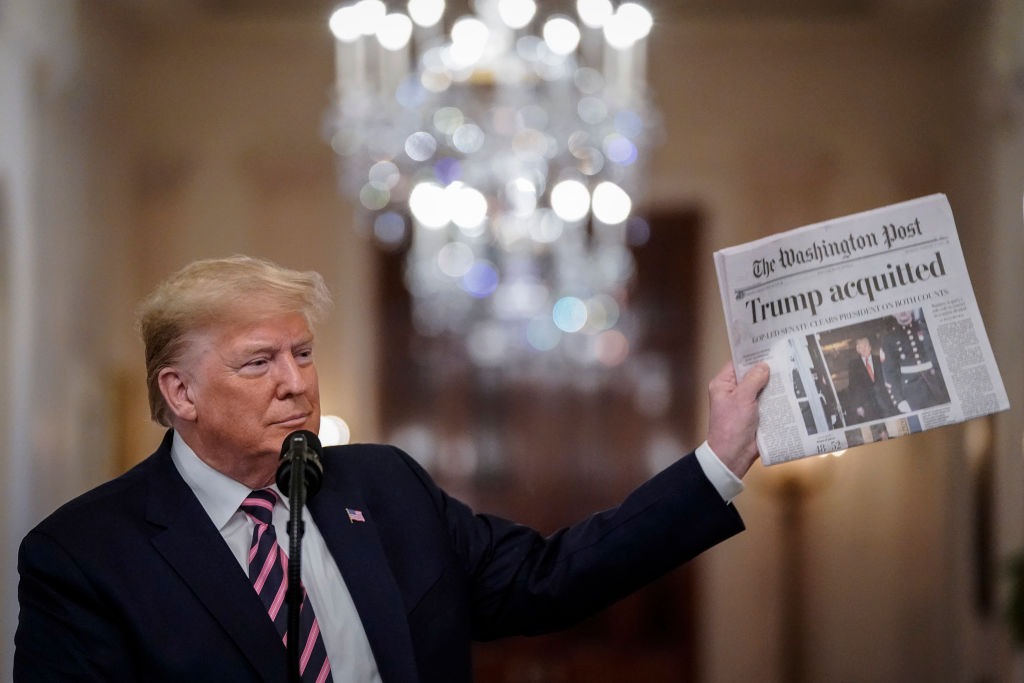|
The stance that Alberta, the chief political correspondent for Politico, and others have taken, seems to call into question the idea of jury nullification. Another way to see Alexander and Rubio is, as Berman writes, as “two fully informed jurors with a concern for proportionate punishment and the broader public interest.” He continues: “Put another way for sentencing fans, we should be ever mindful of how mandatory minimum sentencing schemes (even one in the US Constitution) will necessarily impact the work of all decision-makers in the administration of justice. Also, if jury nullification makes sense in the trial of a President, why not for everyone else?”
Rubio and Alexander are probably trying to hold on to their jobs; it’s hard to believe that they are taking a principled stance about mandatory minimums and sentencing. And yet, there may be a valuable insight to be taken from the politicized nature of the impeachment process. Ordinary juries are told over and over just how limited their role is in the larger criminal legal process. They are told that they simply decide whether the prosecution has proved its case beyond a reasonable doubt, and they must give no thought as to the potential consequences of that decision. In most jurisdictions, the jury is not told the potential sentence if they choose to convict and are forbidden from researching the question. Once, after losing a trial, I spoke to a few of the jurors who told me in no uncertain terms that if they had known the severity of the sentence awaiting my client, they never would have voted to convict.
Often, jurors report feeling like “cogs” in a “machine” whose sole aim is to punish people as frictionlessly as possible. Paul St. Louis, a Virginia resident, was on a federal jury that found a man, Frederick Turner, guilty of drug offenses. “It wasn’t easy to arrive at this verdict, and the result of our deliberations gave us no pleasure,” he later wrote in the Washington Post. “A few months later, I found out the result of our verdict was worse than I expected: Turner, a meth addict with no prior criminal convictions, received a mandatory minimum sentence of 40 years on two counts of having a firearm while dealing drugs. I was astonished; we had no idea that we were sending someone to prison for four decades.” Less than a year into that sentence, Turner killed himself in prison. “Today,” St. Louis wrote, “I feel like a pawn used to send a man down a path that led to his unjustified death.” If he could go back in time, St. Louis says he would nullify because the “sentence he received was simply unjust.”
Seth Stevenson, writing in Slate, recounts his deep regret at reaching a guilty verdict in a 1998 case. “It was the language of the law that hemmed me in. It seemed strict and unyielding.” Stevenson also noticed that cabining people’s roles throughout the system helped make the conviction more likely, and seemed to relieve each player of moral responsibility. “None of these professionals felt they’d had much control over the case’s outcome. The prosecutor who tried a minor as an adult, the judge who sentenced that teenager to decades in prison even though she felt he wasn’t maximally ‘culpable’ in the crime, and the defense attorney who didn’t second-guess any tactical choices on behalf of a losing client—they all felt they’d done what the system required of them.” Both the defense attorney and the judge “reminded me that the onus of the verdict is on the jury. I saw them as the machine’s operators and myself as one of the gears they were turning. They told me I’d been the one in control the whole time.”
At the very least, an impeachment trial forces its jurors to take responsibility for their decision. This is actually closer to the way juries functioned in the U.S. in the 19th century. “Between 1880 and 1930, states and municipalities used law to increase governmental controls over the full range of nineteenth-century avenues for democratic participation,” law professor Tabatha Abu El-Haj writes in a 2011 law review article. “Prior to that, the practice of democratic politics in the United States was less structured by law.” Juries, she writes, “were widely understood to have a legitimate political function and were insulated from judicial second-guessing.” But at the end of the 19th century, “long-standing efforts to limit the criminal jury to the status of a mere fact finder succeeded … putting an end to the republican political conception of the jury.”
It is clear, though, that this goal is still floating around somewhere in the notion of jury service. As Justice Anthony Kennedy wrote for the Supreme Court in the 1991 case Powers v. Ohio, by providing an “opportunity for ordinary citizens to participate in the administration of justice,” the jury trial “preserves the democratic element of the law” and “places the real direction of society in the hands of the governed.”
Kyle Barry, senior legal counsel at The Justice Collaborative, contributed research to this edition.
|


